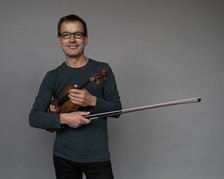
Paul Pankert (b. 1965) studied violin in Liège and Düsseldorf. His musical activity has been primarily focused on the performance of contemporary and baroque music. As solo violin in the Dutch contemporary music group Ensemble’88, he played hundreds of compositions, including numerous first performances, often in close collaboration with the composers.
His own compositional activity began in 2008 with his composition Spaltung, for which he was awarded the composition prize of the Académie Royale de Belgique. Since then he has composed numerous works, including commissions for by Orgelpark Amsterdam, Ars Musica Festival, Brussels, Festival van Vlaanderen, Ostbelgienfestival, Flagey Brussels…
Even if one cannot really assign his compositions to a particular style, they all have one thing in common: a close relationship to baroque music.
Paul is the co-founder of the contemporary music association KL-EX (Klang-Experimente), based in Eastern Belgium.
He was awarded the title of Künstler Ostbelgiens in 2017. The CD/LP production connected in 2020 marks the conclusion of this period.
About the piece
Partita Ritardata for piano & live electronics (2021) encompasses five movements:
– Preludio rimbalzante
– Allemanda ipnotica
– Corrente inciampante
– Sarabanda quasi cromatica
– Giga fuggenda.
For a long time, in addition to contemporary music, I have also been intensively involved with Baroque music. It is therefore not surprising that the formal structures of this epoch are also reflected in my compositions.
Thus, the movements of this Partita show their typical characteristics. After the free Preludio, the Allemande is in strict 4/4 time. The Courante in which the sounds „run after” each other is followed by a slow Sarabande in 3/4 time with its typical accentuation on the first and second beat. A dance-like gigue forms the conclusion.
The term „ritardata” refers to the electronic delay effect that runs through the entire piece in very different variations and is an essential part of the composition. Through subtle varying transpositions of these delayed sounds, the piano acquires a microtonal component.


